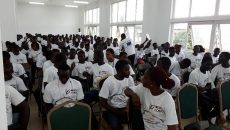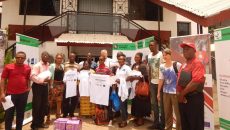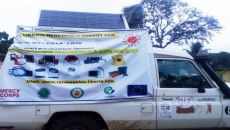MONROVIA, Montserrado – Mercy Corps’ Light Up Liberia program has graduated an additional 21 students following a four-month technical and vocational training in renewable energies.
Light Up Liberia is a European Union-funded project implemented by Mercy Corps to reduce poverty and improve stability and living conditions of the rural poor in Liberia. The project has provided training to young people and helped build the marketing capacity of solar retailers.
Members of the recent class are from the Tubman High Accelerated Vocational Training Program and formed the second edition of the program’s curriculum development component. More than 160 beneficiaries graduated from the program in June this year.
Speaking during the graduation, Mercy Corps’ acting country director Moeen Haider said the program had allowed institutions like the William V.S. Tubman High School, Brooker Washington Institute, Monrovia Vocational Training Institute, and Stella Maris Polytechnic Institute to use their facilities to offer solar energy courses.
Haider sees the participation of the institutions as a boost to the program, noting that staff from both Mercy Corps and the partner institutions have engaged in efforts to attract students to the training program between the last three to eight months. He noted that it was based on the commitment from the staff and institutions that the program was putting out another batch of trained solar technicians.
“Beyond this graduation, Mercy Corps plans to continue the partnership with the participating schools, but also with the desire and plan to extend it to the Ministry of Education,†he said. He also promised that beyond building the capacity of participants of the program, Mercy Corps also intends on working to provide them with employment opportunities.
He said the organization is at the same time seeking to establish a partnership with the Ministry of Education to expand the training into various universities, high schools, and technical vocational educational training institutions to teach basic and advanced solar photovoltaic courses.
“Mercy Corps is committed and welcomes onboard all renewable energy stakeholders to support the expansion of solar technology in Liberia,†he said.
Emmanuel Aziebor, Light Up Liberia’s program manager, recalled how the country’s energy infrastructure was destroyed during the years of the civil war. Aziebor said by 2014, only 9.1 percent of Liberians had access to electricity, even though it is essential for improving living conditions and stimulating markets for inclusive and sustainable economic development.
He said the program also aimed to help the government achieve its goal of connecting at least 35 percent of rural populations to electricity by 2030.
“We are working to support that goal by increasing access to modern, affordable, sustainable and scalable energy services to over 25,000 rural poor in Liberia,†he said.
He added that the goal would be accomplished through a market-based mechanism. He also named commercial distributors as major partners that would ensure availability and increased access to improved lighting and cooking products in rural Liberia.
He said at the close of the project in March 2019, it is expected that at least 3,000 households in villages within Bong, Margibi, Grand Bass, Lofa, Nimba, and Montserrado would have access to some form of solar power. The program also targets increasing access to lighting and cooking products during that time.
Mercy Corps has installed four pico-grids, supported 20 renewable energy distributors, trained 160 persons in solar installation and maintenance, 18 community institutions, and 40 small businesses, Aziebor said. He added that the institution had also connected and distributed 4,100 solar products while at the same time reaching out to 68,936 people to create awareness. He also announced the establishment of the Liberia Energy Access Practitioners Network as part of achievements of the program.
A graduate of the program, Shadrach Vonleh, spoke on behalf of beneficiaries and expressed gratification for the knowledge acquired through the program, noting that he is now knowledgeable in the installation and maintenance of a solar system.
“Solar energy can be used to meet most of our energy demand,†he said. “This form of energy is durable and reliable, even though it incurs more cost for installation. But if compared with other sources of energy such as generator and others, it is cheaper in terms of usage.â€
He promised that they would use their new skills to positively contribute to society: “Liberia cannot meet its energy demand in rural areas with affordable electricity when solar power is underestimated.â€



